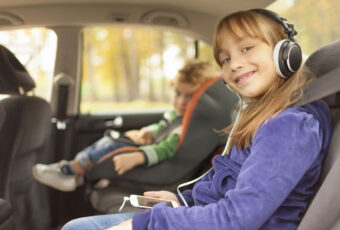It can be one of the most daunting things to face as a parent: is it the right time to leave your kid home alone, or are they not quite there yet? Sometimes it can really be hard, even in a two parent household, to get everything done. At a certain point, it is totally fine to leave kids at home, which can help alleviate some of the stress, but when is it the right time? Experts have weighed in on what they think.

It Can Be Hard To Know Just When It The Right Time
First of all, it’s important to check the legal side of the matter. Many states don’t actually have an age requirement, and the states that do vary from state to state, so it’s important to look into what the law dictates in your state.
CEO of LegalAdvice and family law attorney David Reischer, Esq. shared: “Only three states currently have laws regarding a minimum age for leaving a child home alone, including Illinois, 14 years old; Maryland, 8 years old; and Oregon, 10 years old. However, most states will follow guidelines with the Department of Health and Human Services or other child protective agencies that test a child’s ability to be left home alone. The state will evaluate various factors including the child’s age and maturity, the overall safety of the surrounding area, and any arrangements made to secure the child’s safety.”
That means that there’s a 6 year age age between the legal minimum age of leaving kids at home between Maryland and Illinois. That 6 years can make a huge difference in understanding responsibilities.
A Chicago mom named Christina shared with ScaryMommy: “Z was definitely younger than 14 when he stayed home alone for the first time. I was a single mom, and he often got home from school before I could get home from work. I think he was about 12 when he first started staying home alone. By high school, he was watching his little sister after school.”
Even if your child is at an age when it is appropriate and you believe you’ve prepped them enough, sometimes unexpected things can come up. For example, a Florida mom name Debbie shared: “The first day my 3rd grader came home alone, I sent our neighbor and family friend to check in on her… and she wouldn’t answer the door! She also wouldn’t answer the phone. Luckily, we still had an old-school answering machine. So, I called and talked to her over the answering machine. I told her I would call her right back and that she needed to answer because it was her mom. Then I called, and I told her who was coming to the door. Lesson learned! We made a family code word after that.”

Setting Up House Rules & Check In Times Can Help
Of course, in addition to being able to take care of themselves, you child should also be able to know what to do should an emergency arise. You should be confident that your child knows the house rules and can also provide snacks and water for themselves without needing any help.
There are ways to help make the whole process easier, and of course a cell phone can really simplify getting in touch on either side. Make sure the phone is charged before you leave and that your child knows how to charge the phone if the battery dies.
You can use a nanny cam to help monitor what is going on. You can also try doing a test run by going out for a short 15 minute trip at first to see how things go. Also, establishing check-in times can make both sides feel better, as periodically checking in will let both of you know that the other side is reachable.

At What Age Is A Child Ready?








